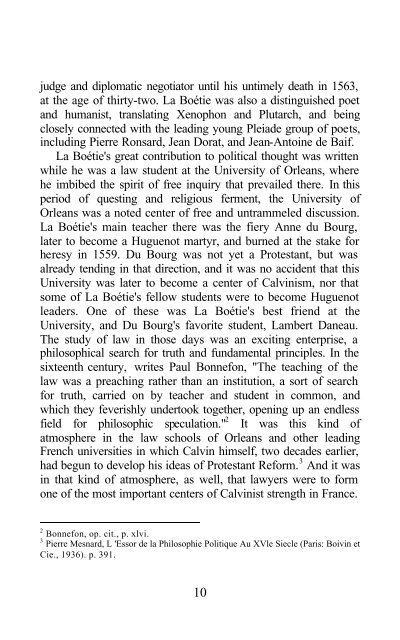Create successful ePaper yourself
Turn your PDF publications into a flip-book with our unique Google optimized e-Paper software.
judge and diplomatic negotiator until his untimely death in 1563,<br />
at the age <strong>of</strong> thirty-two. La Boétie was also a distinguished poet<br />
and humanist, translating Xenophon and Plutarch, and being<br />
closely connected with the leading young Pleiade group <strong>of</strong> poets,<br />
including Pierre Ronsard, Jean Dorat, and Jean-Antoine de Baif.<br />
La Boétie's great contribution to political thought was written<br />
while he was a law student at the University <strong>of</strong> Orleans, where<br />
he imbibed the spirit <strong>of</strong> free inquiry that prevailed there. In this<br />
period <strong>of</strong> questing and religious ferment, the University <strong>of</strong><br />
Orleans was a noted center <strong>of</strong> free and untrammeled discussion.<br />
La Boétie's main teacher there was the fiery Anne du Bourg,<br />
later to become a Huguenot martyr, and burned at the stake for<br />
heresy in 1559. Du Bourg was not yet a Protestant, but was<br />
already tending in that direction, and it was no accident that this<br />
University was later to become a center <strong>of</strong> Calvinism, nor that<br />
some <strong>of</strong> La Boétie's fellow students were to become Huguenot<br />
leaders. One <strong>of</strong> these was La Boétie's best friend at the<br />
University, and Du Bourg's favorite student, Lambert Daneau.<br />
The study <strong>of</strong> law in those days was an exciting enterprise, a<br />
philosophical search for truth and fundamental principles. In the<br />
sixteenth century, writes Paul Bonnefon, "The teaching <strong>of</strong> the<br />
law was a preaching rather than an institution, a sort <strong>of</strong> search<br />
for truth, carried on by teacher and student in common, and<br />
which they feverishly undertook together, opening up an endless<br />
field for philosophic speculation." 2 It was this kind <strong>of</strong><br />
atmosphere in the law schools <strong>of</strong> Orleans and other leading<br />
French universities in which Calvin himself, two decades earlier,<br />
had begun to develop his ideas <strong>of</strong> Protestant Reform. 3 And it was<br />
in that kind <strong>of</strong> atmosphere, as well, that lawyers were to form<br />
one <strong>of</strong> the most important centers <strong>of</strong> Calvinist strength in France.<br />
2 Bonnefon, op. cit., p. xlvi.<br />
3 Pierre Mesnard, L 'Essor de la Philosophie Politique Au XVle Siecle (Paris: Boivin et<br />
Cie., 1936). p. 391.<br />
10


